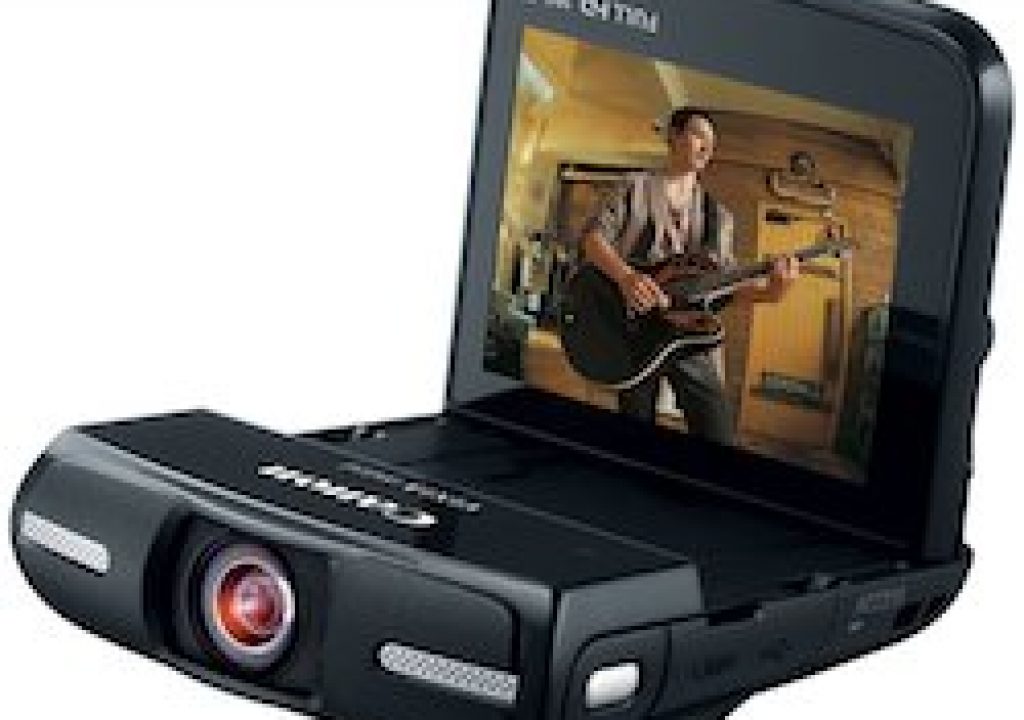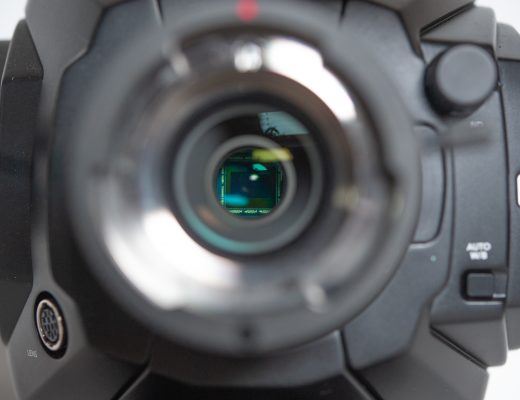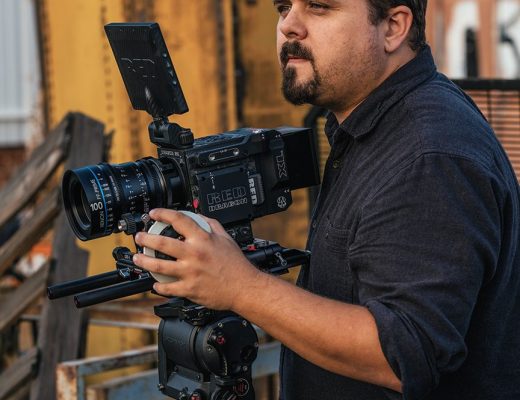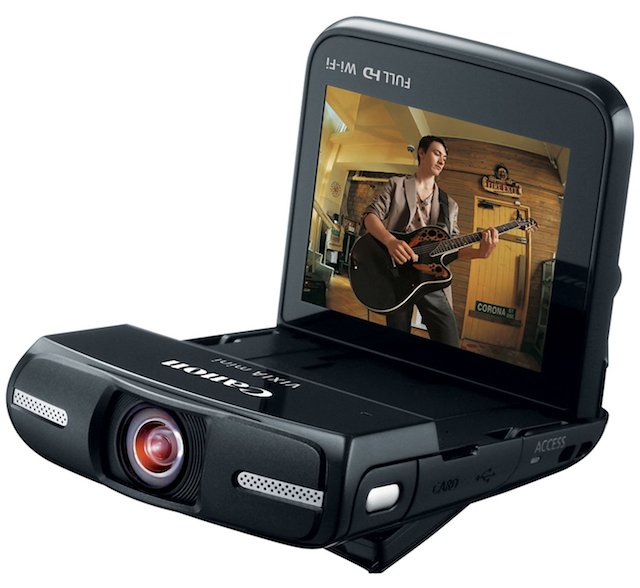
Canon’s latest tiny yet ferocious 1080p cameras, the VIXIA mini (US$299) and VIXIA mini X (US$399) —together with their 25p cousins, the LEGRIA mini and LEGRIA mini X, boast irresistible features while taking positive steps towards the Beyond AVCHD Manifesto. This first look article will focus on the more capable (and quite intriguing) mini X, including videos, specs, potential applications, and my few criticisms.
the mini X, intercut with a Canon C300
This video shows a musical recording, a press conference uploaded to the web wirelessly via a smartphone, a baby monitor, and a 3-cam dramatic shot where two US$399 mini X cameras are seamlessly intercut with a C300. At least one of the two is connected to an external 4:2:2 recorder via HDMI.
Things to love about Canon’s mini X
Both the VIXIA mini X (for 23.976p or 29.97p) and the LEGRIA mini X (for 25p) feature:
- tiny size 82 x 30 x 109 mm (3.2 x 1.2 x 4.3 inches) and weight approximately 240 grams (8.5 ounces) including battery pack and one SD memory card
- a built-in stereo microphone (listen to the audio in the singer in the above video, which used that mic)
- an external microphone input (see details below)
- manual audio level control, with optional audio limiter and optional audio compressor
- a stereo headphone output
- uncompressed (linear PCM) audio recording (see sad note below)
- selectable audio limiter
- selectable audio compressor
- partial compliance with the Beyond AVCHD Manifesto, since the camera fortunately allows you to record pure progressive 1080p MP4 up to 24 Mb/s, without any PsF nonsense at all, and more compatibility either for direct upload or editing on an iPad
- Deep focus, 0.4 m (1.3 ft) to infinity
- a wide angle of 16.8mm (35mm equivalent) in MP4 video mode
- a fisheye lens mode with a 160º video view when in MP4 mode
- close-up mode with stabilization
- timecode (see sad note below)
- uncompressed 4:2:2 recordable HDMI output
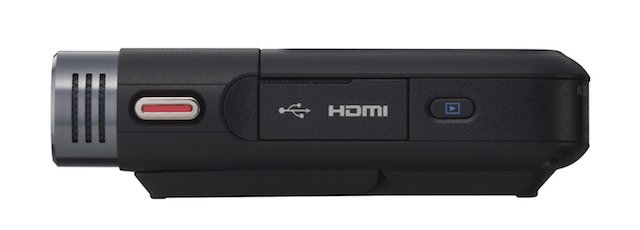
- 2.7″ touchscreen panel
- Slow motion/fast motion/time lapse (see sad note below)
- WiFi control and streaming to iOS (iPad/iPhone/iPod Touch) or Android (see sad note below)
A few things that should be improved with the Canon mini X cameras
- The WiFi only includes the older and severely overpopulated 2.4 GHz band. The more desirable 5 GHz band is currently missing according to the manual. Canon obviously knows about that, since they flaunt the dual band feature in the XA20.
- According to the manual, uncompressed (Linear PCM) audio is only available when recording in the the labyrinthic and tortuous AVCHD mode, and with these particular cameras are not only labyrinthic and tortuous, but also interlaced only (50i for the LEGRIA mini X, and 59.94i for the VIXIA mini X). Canon should also offer uncompressed audio (Linear PCM) in MP4 or in a (currently unavailable) MOV mode. Of course, this doesn’t matter at all if you are planning to record using an external 4:2:2 recorder via the uncompressed live mini HDMI output. (I have reviewed several of such recorders, and am about to cover more soon.)
- Timecode is currently only available in the the labyrinthic and tortuous AVCHD mode, which (as stated above) with these cameras are interlaced only (50i for the LEGRIA mini X, and 59.94i for the VIXIA mini X). Canon should also offer timecode in a progressive MP4 mode, or in a (currently unavailable) MOV mode.
- Although these cameras are obviously compatible with the superior exFAT formatting (since they support SDXC cards), the manual indicates that they unfortunately and unnecessarily break up MP4 files that are over 4GB into sequential files, even when using exFAT. That should be overcome via a firmware update.
- The slow motion mode appears to be quite mediocre, since the manual indicates that the quality drops from 1080p at 24 Mb/s to 720p at 4 Mb/s (x1/2) or 640×360 at 3 Mb/s (x1/4), and (in the case of the VIXIA mini X only) that the playback speed will be set in metadata to 29.97p even though all of your other scenes may have been set to 23.976p.
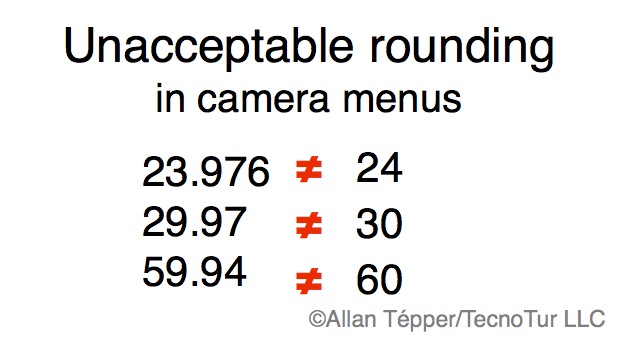
- Regarding the VIXIA mini X only: Although the website and manual fortunately indicate that with this camera, “24p” really means “23.98” (which should really be expressed as 23.976p for workflow reasons) and that “30p” really means 29.97p, the camera menus unfortunately show only the integer expression of “24p” and 30p”, which has confused and thrown off many people I have met, who mistakenly set their editing software’s project for the integer version of the framerate, and then suffer greatly as a result, as I covered in detail in this article.
- The mic input is 3.5 mm stereo unbalanced –64 dBV, so if you plan to use this as your only camera and with an external mic, you’ll definitely want to use an active interface that includes its own amplification, like those manufactured by SoundDevices, Juicedlink, Beachtek and ART, some of which I have covered in recent articles. Fortunately, you don’t have to acquire an interface with a limiter, since the camera itself offers one. Of course, if you are going to use this camera as a 2nd or 3rd camera, you may not need to connect external microphones to it. In that case, you’ll likely be able to use its internal microphone as a reference to help your editor sync with the main camera’s footage.
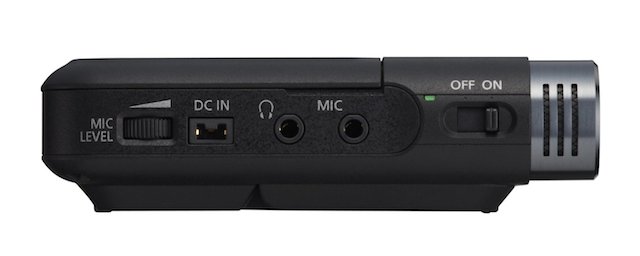
Also for studios
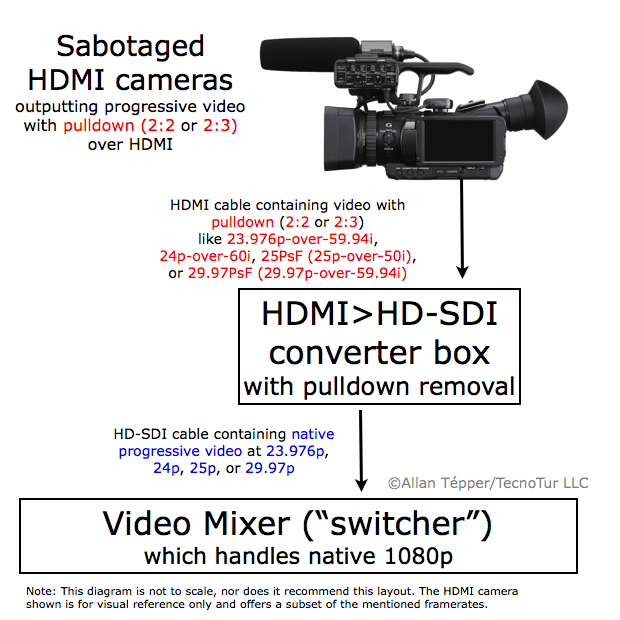 Together with an adapter like an HD-SDI adapter like the H2S which I reviewed here, I see these cameras as usable in a multicamera studio, at least for the wide shot, either fixed or on a crane. The H2S will be ideal for any of the available framerates, whether or not the mini X’s HDMI signal is PsF or true progressive (which is not indicated in the current manual), since the H2S can remove pulldown.
Together with an adapter like an HD-SDI adapter like the H2S which I reviewed here, I see these cameras as usable in a multicamera studio, at least for the wide shot, either fixed or on a crane. The H2S will be ideal for any of the available framerates, whether or not the mini X’s HDMI signal is PsF or true progressive (which is not indicated in the current manual), since the H2S can remove pulldown.
Initial conclusions
Despite the criticisms listed above, I find the US$399 VIXIA mini X and LEGRIA mini X to be exciting cameras for the price, and welcome the opportunity to review either or both of them. The VIXIA mini X should be available by March 21, 2014. I don’t yet have a date or price for the LEGRIA mini X.
Upcoming articles, reviews, and books
Stand by for upcoming articles, reviews, and books. Sign up to my free mailing list by clicking here.
Si deseas suscribirte a mi lista en castellano, visita aquí. Si prefieres, puedes suscribirte a ambas listas (castellano e inglés).
My latest book (paperback + ebook)
My most recent book is available in two languages, and in paperback as well as an ebook. The ebook format is Kindle, but even if you don’t have a Kindle device, you can read Kindle books on many other devices using a free Kindle app. That includes iPad, Android tablets, Mac computers, and Windows computers. Although generally speaking, Kindle books are readable on smartphones like Androids and iPhones, I don’t recommend it for this particular book since it contains both color photos and color comparison charts. The ebook is also DRM-free.
In English:
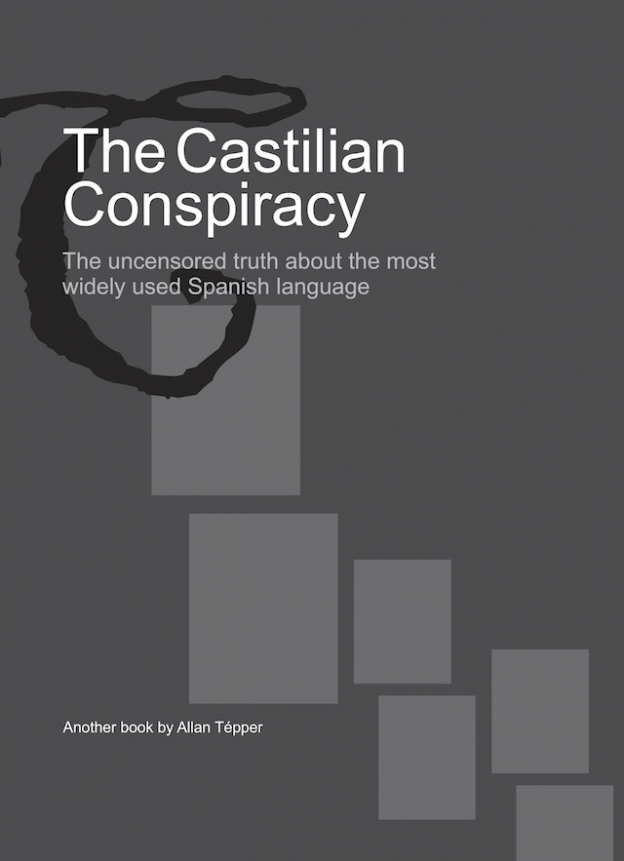
In English, it is currently available in the following Amazon stores, depending upon your region:
- Amazon.com, for the US and other countries in the Americas that don’t currently have their own Amazon store, or anywhere if you simply prefer it
- Amazon.br for Brazil
- Amazon.ca for Canada
- Amazon.de for Germany
- Amazon.es for Spain pero a lo mejor lo preferirás en castellano, a continuación)
- Amazon.fr for France
- Amazon.in for India
- Amazon.it for Italy
- Amazon.co.jp for Japan
- Amazon.com.mx for México
- Amazon.co.uk for the United Kingdom
Or in your favorite bookstore by requesting ISBN–10: 1456310232 or ISBN–13: 978–1456310233.
En castellano:
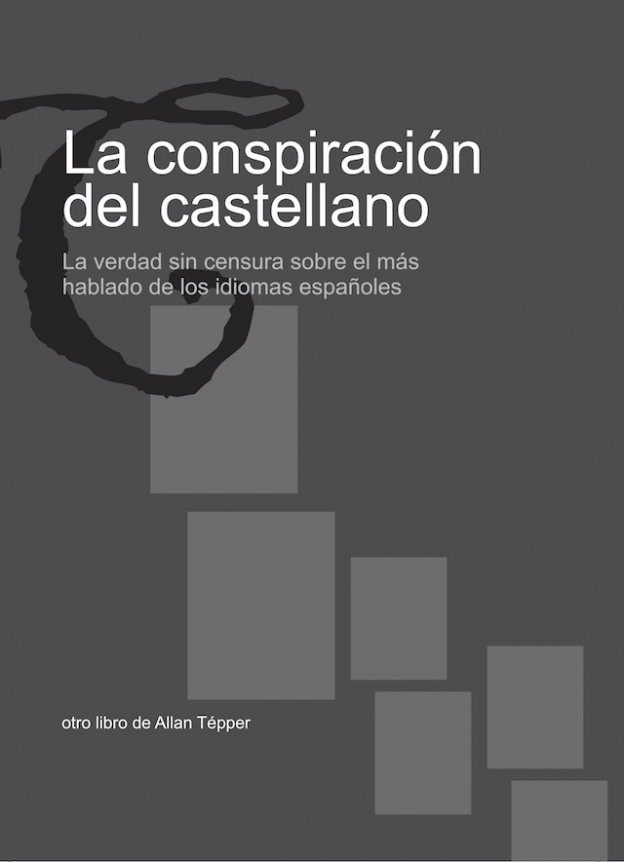
En castellano, está disponible actualmente en las siguientes tiendas Amazon, según tu región:
- Amazon.com para EE.UU. y todas las Américas donde no existe ninguna tienda particular… o en cualquier parte si simplemente lo prefieres
- Amazon.com.br para Brasil
- Amazon.co.jp para Japón
- Amazon.de para Alemania
- Amazon.es para España
- Amazon.fr (Francia)
- Amazon.in para India
- Amazon.it para Italia
- Amazon.com.mx para México
- Amazon.co.uk para el Reino Unido
o en tu librería preferida al solicitar el ISBN–10: 1492783390 ó el ISBN–13: 978–1492783398.
Allan Tépper’s other books, consulting, articles, seminars & audio programs
Contact Allan Tépper for consulting, or find a full listing of his books, articles and upcoming seminars and webinars at AllanTepper.com. Listen to his TecnoTur program, which is now available both in Castilian (aka “Spanish”) and in English, free of charge. Search for TecnoTur in iTunes or visit TecnoTur.us for more information.
FTC disclosure
No manufacturer is specifically paying Allan Tépper or TecnoTur LLC to write this article or the mentioned books. Some of the other manufacturers listed above have contracted Tépper and/or TecnoTur LLC to carry out consulting and/or translations/localizations/transcreations. Many of the manufacturers listed above have sent Allan Tépper review units. So far, none of the manufacturers listed above is/are sponsors of the TecnoTur programs, although they are welcome to do so, and some are, may be (or may have been) sponsors of ProVideo Coalition magazine. Some links to third parties listed in this article and/or on this web page may indirectly benefit TecnoTur LLC via affiliate programs.
Copyright and use of this article
The articles contained in the TecnoTur channel in ProVideo Coalition magazine are copyright Allan Tépper/TecnoTur LLC, except where otherwise attributed. Unauthorized use is prohibited without prior approval, except for short quotes which link back to this page, which are encouraged!

Filmtools
Filmmakers go-to destination for pre-production, production & post production equipment!
Shop Now